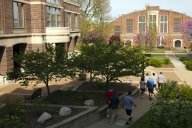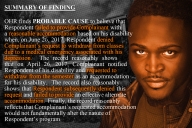You have /5 articles left.
Sign up for a free account or log in.
The start of the academic year is normally a time for convocations to welcome new students to college, and to welcome faculty back.
This year is starting with more uncertainty even than last year. The arrival of the Delta variant has changed plans for some colleges, and prompted many to impose mask requirements or vaccine requirements. But because the Delta variant can be spread even to those who have been vaccinated, there are no guarantees of a COVID-19-free semester for anyone.
Some faculty members are pushing for the right to teach online. And a few Texas institutions are going entirely online -- for the first weeks of the semester.
In Florida, where Governor Ron DeSantis, a Republican, has imposed limits on the ability of colleges to require vaccinations, the University of Florida appeared (briefly) to be preparing to announce that it was switching many classes online for the first three weeks of the semester.
D'Andra Mull, vice president for student life, sent an email to students Friday evening that said in part: "[T]he mode of delivery for your courses may be changed to a virtual environment for the first three weeks of class."
The email prompted news coverage saying the university was switching to online instruction for the first three weeks.
Then Saturday morning, the university released this statement: "In efforts to manage the pandemic's effects on university life, there have been discussions about moving some courses online for the first three weeks of the semester. The decision was made today that UF will not pursue that option, nor will any other university in the State University System. UF will offer courses as indicated in the published Fall Schedule of Classes, with the majority of classes being offered in-person. Some face-to-face courses will be supplemented with additional HyFlex online sections so that students who are not able to attend the class in person may attend online."
And Mull sent students another email, which said in part: "In our efforts to manage the pandemic's effects on university life, there have been discussions about moving some courses online for the first three weeks of the semester, and there have been notifications to that effect for some courses. Upon further review, the decision was made not to do that. ... These are incredibly difficult times. Please know that I appreciate your flexibility as we continue to try to find the best way to serve your needs as students. And please continue to take care of yourself, your loved ones, and your community."
Faculty leaders have been pushing the university to do more about COVID-19, including "immediately provid[ing] remote learning teaching/learning options for all fall 2021 class sections wherever possible, for all faculty and students, with expedited, clear petition/appeal procedures for faculty and graduate teaching/research assistants requesting and/or being denied off-site accommodation," according to a memo August 5 by the United Faculty of Florida's University of Florida chapter.
"The University of Florida faces a real emergency," the memo says. "We simply cannot ignore the recent precipitous rise in COVID infections, pretending that plans that may have seemed reasonable even a few weeks ago are still up to today's challenge."
In California, California State University, Stanislaus announced that it will go online for six weeks, starting August 23, through October 1. Ellen Junn, the president, said in a letter to the campus, "The health, safety and trust of our faculty, staff and students is of utmost importance to us. In response to notable increases in COVID-19 cases locally due to the Delta variant of COVID-19, and the need to reduce potential exposures on campus, we are temporarily delaying the start of in-person instruction and repopulation plans until Oct. 1."
In Texas, where the Republican governor, Greg Abbott, has also opposed policies that would prevent the spread of COVID-19, the Alamo Community College District announced on Friday that it will be online for the first two weeks of the fall semester, which starts August 23.
The colleges, based in San Antonio, will transition to in-person classes on September 7, "dependent on area conditions," according to the announcement.
Those moves follow the University of Texas at San Antonio, which announced it would be online for at least the first three weeks of the semester. President Taylor Eighmy said the university was "balancing an evolving new normal around in-person learning with additional practical controls -- until we see the Delta surge begin to diminish and return to less risky levels similar to what we experienced earlier this summer."
Private universities in San Antonio are thus far open, but are instituting mask requirements for all. The college with such requirements include Our Lady of the Lake University, Trinity University and the University of the Incarnate Word.
In Dallas, Southern Methodist University announced a mask mandate.
The National Scene
"Circumstances are changing," said Terry Hartle, senior vice president for government relations and public affairs at the American Council on Education. "The Delta variant is even forcing schools in areas with high vaccination rates and with COVID-19 vaccination requirements to put in place mitigation measures they had hoped to avoid, such as mask mandates and social distancing."
So far, only a few colleges have decided to suspend in-person teaching, he added. "But as has been the case for the past 18 months, COVID is fast-moving and effectively addressing it requires using all available tools. Especially in states where policy makers are tying the hands of college and university leaders when it comes to employing common sense public health measures, we could see additional schools reconsider their plans for in-person operations."
Hartle said that the ACE backed an American College Health Association statement decrying "dangerous state restrictions" on COVID-19 public health measures. "We believe that the best opportunity for colleges and universities to conduct the coming semester in person and with as close to normal operations as possible is to allow campus leaders to take every public health measure that they deem appropriate to safeguard their students, staff and entire campus community."
The Situation in Pennsylvania
All who work or study at colleges and universities in Philadelphia must get vaccinated by mid-October, or wear masks while indoors and get tested for COVID-19 at least once a week, the city announced Friday, The Philadelphia Inquirer reported.
Once a college reaches a 90 percent vaccination rate, unvaccinated people can forego testing but must wear a mask indoors.
The Philadelphia Board of Health voted to institute the mandate, due to the Delta variant's high transmission rate and climbing infection rates among college students.
Temple University pledged to work toward the goal.
"Public health experts have made it clear that widespread vaccination is our best defense in the fight to mitigate the virus, and to restore the joy and value of gathering with families, friends, and colleagues," President Jason Wingard said in a statement Friday. "It is also the responsible action to protect the health and welfare [of] our communities."
At Pennsylvania State University, the Faculty Senate passed a resolution on Friday expressing no confidence in the university's COVID plan, the Centre Daily Times reported.
The no-confidence resolution passed with 109 votes in favor and 57 against. A separate resolution asking for additional COVID-19 safety measures and a vaccination passed by a 128-32 margin.
Penn State professors and students have been pushing the university to require vaccination, as many of its peer institutions in the Big 10 have chosen to do.
Penn State President Eric J. Barron wrote an open letter on Thursday acknowledging the role of state-level political pressures in shaping the university's COVID-19 protocols. Earlier this summer, Pennsylvania's Democratic governor Tom Wolf vetoed a Republican-backed bill that would have barred state-funded colleges from requiring proof of vaccination against COVID-19.
"Universities with vaccine mandates have been met with implementation, enforcement and legal challenges," Barron wrote. "Public universities, in particular, have challenges with the mode of response to the pandemic. Regulations across the country clearly reflect state-level political realities. State funding of our University requires a two-thirds vote of the Pennsylvania legislature, meaning that our funding relies on strong bipartisan support."
Barron defended the university's approach of incentivizing vaccination and requiring testing for students and employees who do not provide the university with proof of vaccination status. He wrote that 88 percent of students at the flagship University Park campus and 73 percent at other campuses across the state who responded to a survey report being partially or fully vaccinated. He also said more than 73.5 percent of students entering residence halls have provided proof of vaccination, with those numbers "steadily growing on a daily basis."
The Numbers in North Carolina
In North Carolina, some students and faculty members are expressing concern about the low numbers of students who have been vaccinated against COVID-19 at North Carolina State University: 54 percent, according to WRAL News.
A statement from the university said Chancellor Randy Woodson strongly recommends vaccinations for everyone at NC State.
In contrast, 84 percent of students at the University of North Carolina at Chapel Hill had been vaccinated, according to WRAL.
Duke University reported Friday that it had discovered two clusters of COVID-19 cases, among a group of medical students and members of its women's field hockey team.
The university's statement said that university and local health officials had identified the clusters stemming from gatherings in the last week. A total of 29 med students and seven members of the field hockey team had tested positive and were in isolation for 10 days.
All of the students were vaccinated and most had no symptoms; a handful have experienced headaches and congestion.
$100 for Vaccines in Louisiana, Requirement Coming in Minnesota
In Louisiana, Governor John Bel Edwards, a Democrat, on Friday announced the Shot For 100, a new vaccine incentive program that will give $100 to the first 75,000 college students who get their COVID-19 vaccine at participating institutions of higher education.
People who are 18- to 29-years-old are one of the two least vaccinated age groups in Louisiana, and are reporting the most cases statewide, he said.
"With the spread of the highly transmissible Delta variant and its devastating impact on our communities including younger populations, we are seeing more young people go sleeves up. And that's good. More than anything, students want an in-person college experience. But to do that safely, we& need more shots in arms," said Governor Edwards.
The University of Minnesota Board of Regents on Friday approved a COVID-19 vaccination requirement for the 60,000 students attending the system's five campuses. The mandate will take effect once the U.S. Food and Drug Administration gives final approval to a COVID-19 vaccine, which is expected in the coming weeks, The Star Tribune reported.
Faculty and staff members at the Twin Cities, Duluth, Rochester, Crookston and Morris campuses must either get vaccinated or undergo regular COVID testing.
"The health and wellness of every member of our university family has always been our top priority, as is ensuring that we are safely able to be together this fall," President Joan Gabel said.
Washington State University is changing its policy when the FDA rules that the vaccines are fully approved. The university will discontinue "its personal and philosophical exemption under the student vaccination requirement."
"Once the personal exemption is formally removed from the university's vaccination policy, students will have up to 45 days to initiate the vaccination process by getting at least one dose of an approved vaccine or request a new religious or medical exemption. Upon FDA approval, the updated process for filing a new medical or religious exemption will be provided," the university said.
More Incentives
More colleges are doling out incentives and penalties to get students vaccinated ahead of the fall.
Mott Community College in Flint, Michigan is offering students enrolled in fall 2021 classes a $750 tuition credit if they provide proof of receiving a COVID-19 vaccine. The incentive program, which began last Saturday, covers the cost of one class. Students must show they got at least one shot by Sept. 17, and if needed, a second shot by Oct. 22. A vaccine card, a photo of a vaccine card, or county health records can all serve as proof of vaccination.
"MCC strongly recommends everyone get vaccinated to keep themselves and others safe as we return to a mix of virtual and in-person classes and events," Jason Wilson, vice president of student academic success, said in a news release.
Blackfeet Community College in Montana will give $100 to every student that offers proof of vaccination, the Great Falls Tribune reported. All vaccinated students will also be entered in a lottery for 15 prizes of $5,000 scholarships for the spring semester.
West Virginia Wesleyan College, in contrast, is charging students a $750 non-refundable fee if they come to campus without proof of vaccination this fall, CBS News reported. Students infected with the virus and unable to go home will need to pay $250 to be quarantined on campus after two days of free isolated housing.
-- Doug Lederman, Elizabeth Redden and Sara Weismann contributed to this article.








